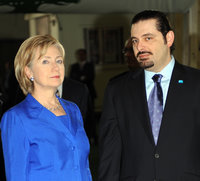A covert Israeli-Lebanese intelligence war, combined with tension along the two countries' border and fears of renewed Lebanese civil strife, has created policy dilemmas for the United States and France as they seek to strengthen the Lebanese government while isolating Hezbollah. The Shiite militia-cum-political party, which the U.S. and France have both designated as a terrorist organization, occupies two cabinet posts in Lebanon's constitutionally mandated power-sharing arrangement.
The intelligence war as well as a recent Lebanese-Israeli border clash in which five people were killed have persuaded Lebanese President Michael Sulaiman and Prime Minister Saad Hariri to increase coordination between Lebanon's national armed forces and intelligence services and Hezbollah, which maintains its own armed militia. The goal is to thwart Israel's apparently extensive infiltration of Lebanon, to expand the presence of Lebanese regular forces along the largely Hezbollah-controlled Lebanese side of the border with Israel, and to prevent Lebanon from sliding into civil war. Expectations that a United Nations inquiry will implicate Hezbollah operatives in the 2005 assassination of Hariri's father, former Prime Minister Rafik Hariri, have fueled fears of renewed Lebanese civil strife.
Lebanon has compiled a list of 150 cases of Israeli espionage, which it intends to submit to the U.N. Security Council. Scores of alleged Israeli spies -- including government and army officials, phone company executives and a car dealer who allegedly sold Hezbollah SUVs equipped with tracking devices that allowed Israel to follow their movements -- have been arrested in the last two years. The Lebanese government has also helped Hezbollah bust alleged Israeli spy cells by granting it access to tools and tradecraft acquired from its U.S. and European allies. Just in the last month, Lebanese courts have charged an army colonel and telecom executive with spying for Israel and sentenced two men to death, bringing to five the number of people handed the death penalty in the past year for spying for Israel. Lebanese authorities also arrested a prominent politician and a retired general who had headed the army's counterterrorism and espionage unit.

